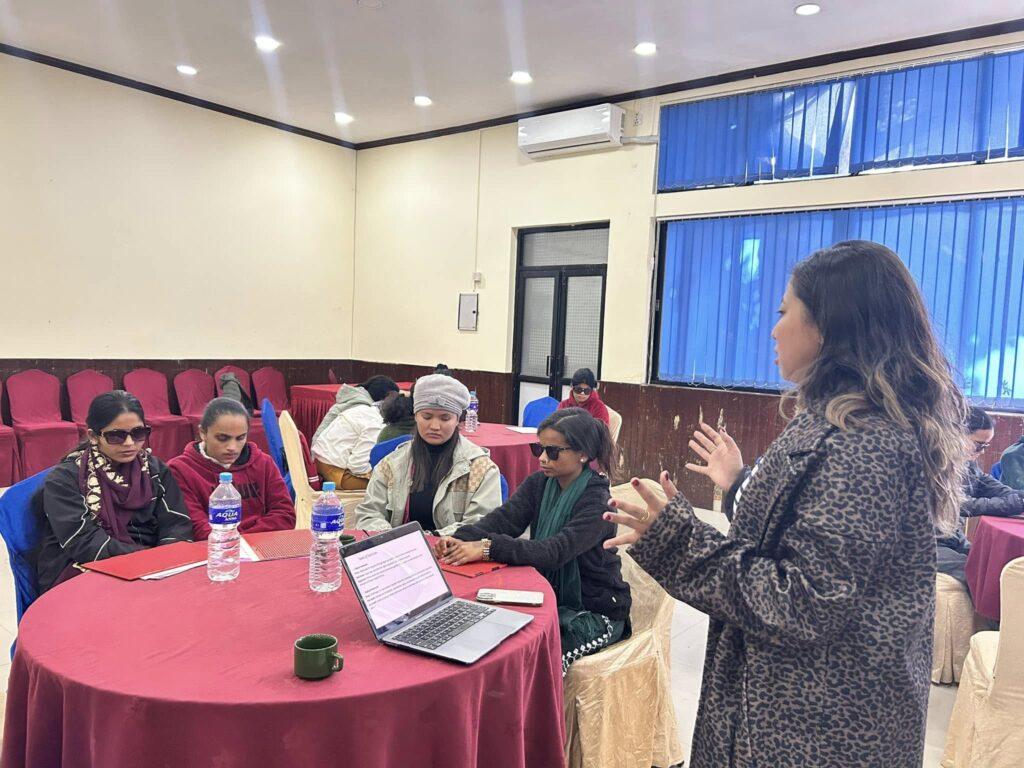
Prayatna Nepal is a self-help organization dedicated to improving the lives of women and girls with visual impairments. It was founded by a diverse group of women, both with and without visual impairments. Five of the seven board members,71% have visual impairments, including the chairperson. By including women with and without disabilities, the organization aims to leverage everyone's unique perspectives to enhance the social, cultural, economic, environmental, and political conditions for women with visual impairments.
The first day of the training began with Ms. Sarita Lamichhane (Chairperson of Prayatna Nepal) welcoming all the participants and sharing the objectives of the training. Then a short introduction with participants expressing their understanding of feminism in a single sentence took place before going into the session. Participants were assigned roles as timekeepers, entertainers, and reporters. After the introduction round, participants were asked to share their expectations about the training. Then, Ms. Pushpa Joshi (facilitator) delved into the formal session by brainstorming about the topic and explained about definition, types, waves and history of feminism while interconnecting it with sex and gender. Participants were asked to name their groups using terms that are essential to human life but often stigmatized by society. The groups creatively chose names such as condom, sex, vagina, penis, and masturbation. After a short tea break, the session resumed with discussion on patriarchy, its meaning and its negative impact on both male and female. The session then progressed to an in-depth exploration of feminist waves, including:
- First wave feminism
- Second wave feminism
- Third wave feminism
- Fourth wave feminism
The training continued with a comprehensive discussion of various feminist perspectives:
- Liberal feminism
- Radical feminism
- Social Marxist feminism
- Eco feminism
- Intersectional feminism
The session concluded with participants clearing their queries and feedback.
The second session was facilitated by Mr. Sanjog Thakuri on Definition of Man and Masculinity while exploring its interconnection with Feminism. He interlinked the previous session and explained the topic in a simplified way. Through group exercises focused on gender and femininity, participants were encouraged to share their perspectives, leading to deeper insights and awareness of these topics. The discussion on masculinity and its various forms was particularly engaging, as Mr. Thakuri incorporated real-life examples that helped participants feel comfortable asking questions and sharing their thoughts. Furthermore, discussion on benefits of male in feminism took place. The session ended with listening a poem by Kunta Sharma “Pothi Basnu Hudaina”.
Day two of the training began with the reporter presenting the learnings from the previous day. Ms. Asmita Devkota then facilitated the session on legal provision to ensure the feminist right and access on service. She focused on both national and international laws related to women’s rights and feminism. The session was more focused on CEDAW (Convention on the Elimination of all forms of Discrimination Against Women). The session concluded with addressing the queries from the participants. In the second session, Ms. Sarita Lamichhane explored on feminist theory, patriarchy concept & characteristics and online violence & its complaint mechanism. Her clear explanation generated interest in participants who actively engaged in discussion. Furthermore, the session on online violence and its complaint mechanism took place where the facilitator explained about online violence, its types and complaint mechanism. As most of the participants had limited knowledge regarding the types of online violence and their complaint mechanism, the session was more engaging and informative.
The two days of training concluded with the chairperson thanking everyone involved for successful completion of the training.
“I would like to thank the Prayatna Nepal team, especially Sanjog sir, for clearing my doubts about feminism. I previously wondered how a man could be feminist, but after attending the training, I understood that feminism is not defined by gender.” – One of the participants
“I wanted to gain clarity on the concept of feminism and understand related issues and topics. After completing the training, I now feel equipped to address any questions others may have about feminism. – One of the participants
“I will put feminist theory into practice.” – One of the participants
“Previously, I was unaware of the different types of violence and the mechanisms for reporting them. Now that I understand these types, I will be more careful about others' intentions and will speak up if I face any form of violence.” – One of the participants


